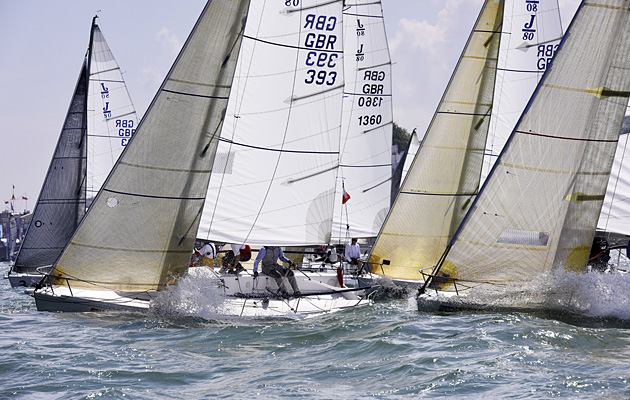As the breeze refused to play to the forecast, there was plenty of confusion afloat and ashore for the opening day of this year’s Aberdeen Asset Management Cowes week.
While a two hour postponement was displayed at the Royal Yacht Squadron’s flag mast, the light easterly breeze provided what appeared to be almost perfect conditions to kick off the 180th edition of the event.
Those who had taken advantage of the conditions to shake down their boats and crews were left wondering why the racing wasn’t getting underway.
Meanwhile ashore, the race committee, who had expected the light morning breeze to be cancelled out by a developing sea breeze, were left wondering what was driving this steady easterly. Few doubted that a conventional south westerly sea breeze would develop and cancel out anything from the east, but the concern was, when.
Murphy’s law suggested that the dead spot would happen at the worst possible moment, once racing had got underway.
And for the black group at least, this was what happened.
Sailing aboard Richard Matthews’s 42-footer Oystercatcher XXX in Class 0, we had a downwind start in the light easterly that saw us hugging the mainland shore to keep out of the east going flood tide. Gybe after gybe, our tactics were determined by the echo sounder as we followed the contortions of the shallow depth contours.
During the delay before the race started I had been talking to Richard, who has competed in over 40 Cowes Weeks, about what his tips and tricks were for a light wind day in the Solent.
“It’s all about tide,” he said. “You just have to work around how to avoid getting trapped by it, as well as how to make the best use of it.”
Words that were left ringing in our heads over the next four hours as every leg provided a tactical tidal challenge.
For all those that had headed to the west it was no different with huge changes in fortunes in several of the fleets as the fickle breeze and strong tides played snakes and ladders with the classes, turning them inside out at will.
In our class, Sir Keith Mills’s Invictus and Stuart Whitehead’s Rebellion managed to experience both ends of class zero going from dominant positions in the front, to depressing positions at the back as a middle race gamble went badly wrong.
After four hours and with the time limit looming, our race was shortened a few miles from the finish. Others weren’t so fortunate as the breeze died once again, just as the tide had turned against them on their final approach to the finish, leaving them battling to make ground as the clock counted down. Many didn’t make it.
A cruel way to end a confusing day.




